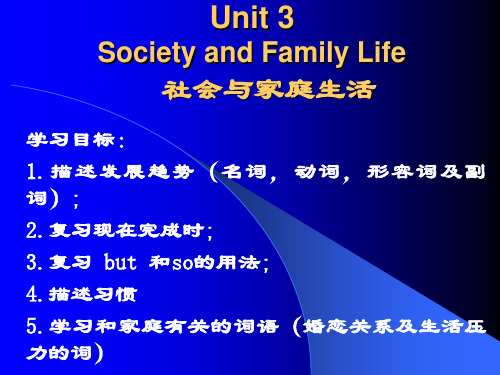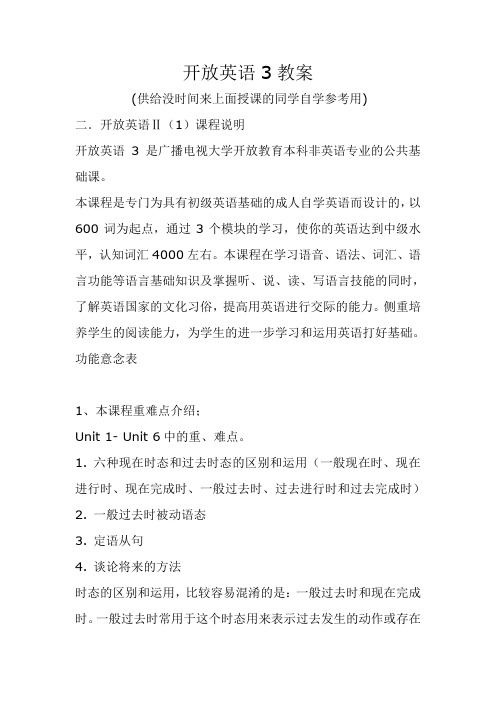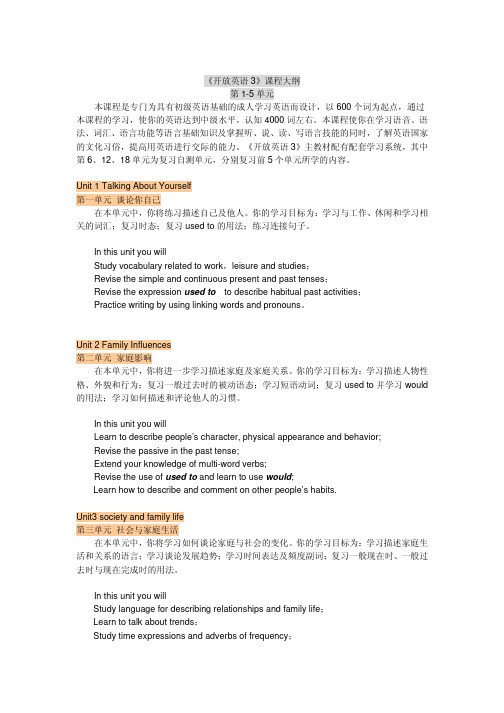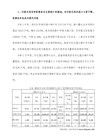开放英语3教案- (要点) Unit 3 Society and Family Life 社会与家庭生活
开放英语IUnit 3

5. 动名词的被动语态:being + done (过去分词) eg: She doesn’t like being left on her own for very long.
He remember being hit on the head. 6. 动词不定式的逻辑主语:for + 逻辑主语 + to 不定式 eg: I always arrange for a neighbour to come.
12. rob (抢劫,抢掠);robbery (抢劫的行为); robber (强 盗,盗贼);
13. split-split-split 分开,分裂, 分离 14. stress (压力, 强调, 重音)+ful=stressful (紧张的) 15. trap: trapped 使……受限制,陷阱
Unemployment has gone up rapidly form 4% in 1997 to 8% now.
2.副词和形容词 *有些副词和形容词:可用来限定、修饰变化趋势。 eg: Unemployment has gone up slowly.
There has been a slight rise in population.
2. so “因此” eg: There has been a steady rise in production, so we have employed more staff.
3. 如果but 或so所连接的两个分句主语是一致的,第二个 分句的主语则需用代词。
eg: 1) The minimum wage has increased. The minimum wage is not enough to stop poverty. The minimum wage has increased, but it is not enough to
开放英语3教案

开放英语3教案(供给没时间来上面授课的同学自学参考用)二.开放英语Ⅱ(1)课程说明开放英语3是广播电视大学开放教育本科非英语专业的公共基础课。
本课程是专门为具有初级英语基础的成人自学英语而设计的,以600词为起点,通过3个模块的学习,使你的英语达到中级水平,认知词汇4000左右。
本课程在学习语音、语法、词汇、语言功能等语言基础知识及掌握听、说、读、写语言技能的同时,了解英语国家的文化习俗,提高用英语进行交际的能力。
侧重培养学生的阅读能力,为学生的进一步学习和运用英语打好基础。
功能意念表1、本课程重难点介绍;Unit 1- Unit 6中的重、难点。
1. 六种现在时态和过去时态的区别和运用(一般现在时、现在进行时、现在完成时、一般过去时、过去进行时和过去完成时)2. 一般过去时被动语态3. 定语从句4. 谈论将来的方法时态的区别和运用,比较容易混淆的是:一般过去时和现在完成时。
一般过去时常用于这个时态用来表示过去发生的动作或存在的状态。
它既可以指某次具体的动作,也可以指重复性的动作, 常与表示过去特定时间的状语连用。
例如:When I was a little girl, my brothers and I collected stamps for many years.而现在完成时表示过去发生的动作或事情对现在的影响或产生的结果,着眼点在现在。
现在完成时常与不确定的过去时间状语连用,如:just, before, once等,也同包括现在时间在内的时间状语连用,如:now, today, this morning, this month, this year等。
但不能同特定的过去时间状语连用,如:in 1933, last year等。
或表示一个从过去某个时间开始,延续到现在,并可能延续下去的动作。
常同表示一段时间的状语连用,如:so far, since, for a long time, for the last few years等。
新模式英三教案Unit-3资料

教师活动内容
学生活动内容
时间
Organization
Check all the students and be prepared for the class.
Lesson1
House hunting
Step 1Ask students tothink about the place where they live. How did they find it? What are some different ways to find housing?
avail: availablebalc: balcony
bdrm: bedroomctr: center
fl: floorfrig: refrigerator
gar: garagel/r: living room
lge, lrg: largeMo.: month
Step4Here are more ways to make comparisons. Study the charts on page 42, and then finish exercise F,G..
Listen to the teacher.
Learn the uses of useful words and phrases and makeexamples.
Listenand takenotes.
Work in pairs.
2′
15′
15′
15′
教与学互动设计
教师活动内容
学生活动内容
时间
Step3Study chart with your classmates and teachers.Thenpracticeasking and answering yes/no questions with a partner, using the Nguyen family’s preferences on page 44.
开放英语-3学习笔记一

《开放英语3》课程大纲第1-5单元本课程是专门为具有初级英语基础的成人学习英语而设计,以600个词为起点,通过本课程的学习,使你的英语达到中级水平,认知4000词左右。
本课程使你在学习语音、语法、词汇、语言功能等语言基础知识及掌握听、说、读、写语言技能的同时,了解英语国家的文化习俗,提高用英语进行交际的能力。
《开放英语3》主教材配有配套学习系统,其中第6、12、18单元为复习自测单元,分别复习前5个单元所学的内容。
Unit 1 Talking About Yourself第一单元谈论你自己在本单元中,你将练习描述自己及他人。
你的学习目标为:学习与工作、休闲和学习相关的词汇;复习时态;复习used to的用法;练习连接句子。
In this unit you willStudy vocabulary related to work,leisure and studies;Revise the simple and continuous present and past tenses;Revise the expression used to to describe habitual past activities;Practice writing by using linking words and pronouns。
Unit 2 Family Influences第二单元家庭影响在本单元中,你将进一步学习描述家庭及家庭关系。
你的学习目标为:学习描述人物性格、外貌和行为;复习一般过去时的被动语态;学习短语动词;复习used to并学习would 的用法;学习如何描述和评论他人的习惯。
In this unit you willLearn to describe people’s character, physical appearance and behavior;Revise the passive in the past tense;Extend your knowledge of multi-word verbs;Revise the use of used to and learn to use would;Learn how to describe and comment on other people’s habits.Unit3 society and family life第三单元社会与家庭生活在本单元中,你将学习如何谈论家庭与社会的变化。
开放英语3教案- (要点)(朱明zhubob

Unit 1英文信件的格式:一般现在时和现在进行时练习:选用适当的时态填空。
1. She is staying (stay) with her sister at the moment.2.Hurry! The train is coming. (come).I don’t want (not want) to miss it.3. The Huangpu River flows (flow) into the East China Sea.4. The river is flowing (flow) very fast today.5. Does it snow (it / snow) in Kunming in winter?改写下列句子:1.Where you live?Where do you live?2.How spell your name?How do you spell your name?3.Where you staying this month?Where are you staying this month?4.Who do work for?Who do you work for?5. You like the film?Do you like the film?复习一般过去时和过去进行时练习:选用适当的时态填空。
1.W e _lived_ (live) in Manchester from 1987to 1994, but we have moved to Liverpool now.2.W hen we were kids, we _went_ (go) to3.I_was playing_ (play) basketball at 3 o’clock yesterday afternoon.利用所给的特殊疑问词提问:1.M y brothers and I collected stamps for many years. (What)What did your brothers and you collect for many years?2.S he worked in the post office on Saturdays. (When)When did she work in the post office?3.T he students were playing football on the playground. (Who)Who were playing football on the playground?4.S he didn’t go to school yesterday, because she is ill. (Why)Why didn’t she go to school yesterday?连接下列的句子:(and, but, although, because, with)1.W e were very excited. England were playing West Germany in the final.We were very excited because England were playing West Germany in the final.2.S he wasn’t watching the match. She was listening to it on the radio.Although She wasn’t watching the match, She was listening to it on the radio.She wasn’t watching the match, but She was listening to it on the radio.3.I t was a limited edition. It had ENGLAND WINNERS on each stamp.It was a limited edition with ENGLAND WINNERS on each stamp.4.W e still have it today. Perhaps it is worth a lot of money.We still have it today, and perhaps it is worth a lot of money.《直通车》模拟自测1Use of English1. -Nice weather, isn’t it? - _____________.A. I’m not sureB. You know it wellC. Yes, it isD. Yes, it isn’t.2. –I think the Internet is very helpful. -_____________.A. Yes, so do IB. That’s a very good ideaC. Neither do ID. I’d rather go surfing on it.3. –What subjects are you studying? -_____________.A.Yes, I’m studying historyB.I’m studying nowC.I’m studying philosophyD.I’m doing my homework4. –Which language do speak at home? -_____________.E.I speak English very wellF.I can speak English and FrenchG.English is my mother tongue5.-Must we hand in our homework now? -____________.A. Yes, you willB. Yes, you mustn’tC. No, you needn’tD. No, you mustn’t6. –Help yourself to the steak, Maggie. -_____________.I.Sorry, I’ve had enoughJ.Thank you, HelenK.Yes. But it isn’t cooked wellL.Help yourself to it, too7. –Go that way and take a seat. - _____________. M.N o, I’m not tiredN.Thanks, but I’d rather standC. Yes, that’s a good wayD. It doesn’t matter8. –Are you sure about that? - _____________. O.You needn’t worry about thatP.I like the ideaQ.Oh, no. I’m afraid of thatR.Oh, yes. I’m absolutely positive- _____________.S.I’ve never been thereT.The next one is fasterU.They leave every hourD. The city is far away10. –There’s a new cafeteria at the corner. How about going there for supper?- _____________.A.Fine. But it’s my treat this timeB.It’s newly decoratedC. Let’s look at the menu firstD. I have no idea about what to order1.O n his first sea ___, he was still quite young but showed great courage to face the storms.A. tripB. travelC. tourD. voyage2.L et me __ the case carefully before I draw a conclusion.A. look upB. look intoC. look afterD. look out3.H e, as well as I, ___ a student.4.T he farmer caught the boys ___ his apples.A. stealingB. stoleC. to stealD. would steal一、交际用语二、词汇与结构三、完型填空四、阅读理解五、书面表达(15分)Unit 2used to 和would 的用法(*P27-Language Focus)Unit 2used to 和would 的用法(*P27-Language Focus)27. Ancient Greece is the ____ of western civilization.A. originB. sourceC. placeD. sources28. His attitude toward us seems ____.A. nicelyB. warmlyC. kindlyD. friendly30. I know this is the secret between you and me, and I promise never to ___ it to anyone else.A. mentionB. talkC. speechD. announce31. In addition to rice, we need to ____ our diet with fish, meat and vegetable.A. supplementB. replaceC. addD. eat32. ____, we keep records on all the experiments so that we may have enough data.A. As a wholeB. As a ruleC. On the averageD. By all means33. No one can possibly recall any detail about the meeting. It is at least five years since it ____.A. had taken placeB. was taken placeC. took placeD. was taking place34. He, as well as I, ____ a student.A. beB. amC. areD. is35. Las month, he paid a visit to the village ____ he had once worked for five years.A. whereB. whichC. thatD. in that36. Frank plays ____ Alex.A.a lot more better thanB. much more better thanC. a lot better thanD. much more well than37. He seldom does his homework at school on weekdays, ____he?A. doesn’tB. isn’tC. doesD. is39. These plants are rather difficult ____.A. to look afterB. to be looked afterC. being looked afterD. looking after40. We advised him to give up smoking, ____ a lot of exercise.A. to doB. and to doC. and doD. and doing。
开放英语3课程介绍

主教材《开放英语3》共18个学习单 元(Unit),每单元分为两个部分( Session),每个部分由若干活动( Activity Activity)组成,其中6、12、18单元 6 12 18 为复习与自测单元。每单元的学习量 约为3学时。
OUTLINE
1. 课程介绍 • 课程开设对象、时间、学分、 课程开设对象、时间、学分、 学习模式、 学习模式、学习系统 2. 课程考核 • 形成性考核、课程终结考试 形成性考核、 3. 试点过程及注意事项 • 上报阶段、培训阶段、学习阶 上报阶段、培训阶段、 段、期末阶段
《开放英语3》 开放英语 》
课程说明
《开放英语3》课程说明 开放英语 》
课程说明 • 英语II (1)有文字教材两本: • 《开放英语3》、《开放英语综合练习》。 • 本课程是中央广播电视大学公共英语课, 供本科各类专业(不含英语专业)的学生 学习。课内总学时为54学时,一学期完成 。共3学分。
•
课程介绍
1. 课程开设对象:电大开放本科 课程开设对象: 非英语专业的学生 2. 时间:第一学期 时间: 3. 学分:3 学时:54 学分: 学时: 4. 学习模式:基于计算机的自主 学习模式: 学习为主、 学习为主、面授辅导课为辅
课程介绍
5. 学习系统
1. 光盘学习系统
• 单元学习: 普通单元 (15) + 自测单 单元学习 元 (3) • 辅助工具栏:单元目录;词汇表; 辅助工具栏:单元目录;词汇表; 功能表;语法;轻松一刻; 功能表;语法;轻松一刻;网上学 习资源;使用帮助; 习资源;使用帮助;制作成员
课程介绍
5. 学习系统 具体了解其使用说明,登陆考试平台: 具体了解其使用说明,登陆考试平台: 开放英语3多媒体学习系统演示课件 开放英语 多媒体学习系统演示课件
21世纪大学英语第三册教案第三单元n3-unit3

Unit 3 T ext A The Sense of WonderI. T eaching Objectives1.To understand the writer’s purpose to write the text and appreciate the senses that we usually take forgranted.2.To grasp the key words and phrases.3.To master the skills of writing and reading in this unit.1) To persuade someone that it’s easier than they think to do something worthwhile.2) To understand idiomatic expressions in reading materials.II. Teaching Content1. Lead-in Activities2. Text Organization3. Skill Learning in Writing and Reading4. Language Points( key words, phrases and difficult sentences)5. Grammar Focus ( The “if…then…” structure)6. Guided Practice (exercises, oral practice and group work)III. Teaching Process1.Warm-up Questions1)If you had to lose one of your senses, which one would you choose to give up? And having lost it, what do you think you’d miss the most?2) It’s common to speak of “ the five senses”---but are there only five? Some researchers say that we all have and use other senses as well. What others can you think of ?2.Text OrganizationPart I (Para 1) Fact: Children lose their sense of wonder before they reach adulthood.Part II (Paras.2-5) How to preserve or keep alive the sense of wonder?(Questions) 1) Who can be of help? 2) How can parents be of help?Part III (Paras6-9) What is the value of preserving or strengthening the sense of wonder?(It is more than just a pleasant way of passing the golden hours or children.)3. Skill Learning in Writing and Reading1)To persuade someone that it’s easier than they think to do something worthwhile by placing most of the possible objections in “ even if” and “wherever” clauses and arguing against them or responding directly and immediately.e.g (Para 4) Even if you have little knowledge of nature at your disposal, there is still much youcan do for your child. Wherever you are and whatever your resources, you can still look up at the sky….Y ou can still feel…2)To understand idiomatic expressions with the help of the context cl ues― examples, explanations, contrasts or parallel phrases. (Note: In the case of idiomatic expressions, word formation clues can be1misleading.)4. Language points1) wonder --- n. a feeling of great surprise and admiration caused by seeing or experiencing something that is strange and new (the title)Examples:The sight of the Great Wall stretching out under their feet filled them with wonder.The children watched the magician in silent wonder.2) If I had influence with the angels who are supposed to pr eside over all children, …. (para.1) influence with sb. -- ability to obtain favorable treatment from sb., usu. by means of acquaintance, status, wealth, etc.Examples:She has great influence with the manager.My influence with her is not very strong.preside over --- be head or director of; control or be responsible forExamples:The city council is presided over by the mayor.The government has presided over some of the most significant changes in education in the last decade. 3) Parents often feel inadequate when confronted on the one hand with the eager, sensitive mind of a child and on the other with a world of complex physical nature. (para.2)confront --- vt. stand or meet face to face; bring face to faceIf a problem, task, or difficulty confronts you, or if you are confronted with it, it is something that you cannot avoid and must deal with; if you confront a difficult situation, you accept the fact that it exists and try to deal with it.Examples:We soon have to confront a fundamental question.Can you think of some typical problems that confront Chinese learning English?physical --- a. having material existence; of or relating to material thingsExamples:All physical objects occupy space.the physical world4) in a mood of self-defeat---feeling helpless. (para.2)5) it is not half so important to know as it is to feel (para.3)Paraphrase --- to feel is certainly more important than to know.Not half is used in informal English to emphasize an opinion or the truth of a statement. Examples:It isn't half cold here in winter.Films these days aren’t half as good as they used to be.to feel---to have the feeling or emotion; to have the sense of wonder.to know ---to have the knowledge; to know the facts.6) It is more important to pave the way for chi ldren’s desire to know … (para.3)pave the way (for )---create a situation in which something specified is possible and can happen.] Examples:Data from the probe will pave the way for a more detailed study of Mars.His work paved the way for the new theory.7) have little knowledge of nature at your disposal (para.4)at sb.'s disposal -- available for sb. to use as he wishesExamples:If you want some help preparing for the party I can be at your disposal all day2I would take you if I could, but I don’t h ave a car at my disposal this week.8) the mysteries of natural selection embodied in the perfume and flavor of fruit. (para.4)Natural selection---The theory of natural selection is based on the idea that living things are in constant competition for limited but essential resources in their environment -- such as food, places to hide, and opportunities to breed. Accordingly, natural selection favors any trait that helps an organism or its offspring survive. For example, the daring shown by birds in the face of a predator near the nest involves the risk of death. Nonetheless, natural selection compensates the risk by increasing the offspring's chances of survival.embody -- vt. contain and express as an important featureExamples:His principles were embodied in her behavior.The latest computer model embodies many new features.8) a matter of being open to what lies all around you (para.5)be open to (an idea, etc.) -- be ready and willing to accept and to try and understand or consider (an idea, etc.)Examples:We haven't decided on a price, but we're open to offers.We are open to suggestions.9)their thoughts can find paths that lead to inner satisfaction and to renewed excitement in living (para.7) Paraphrase --- they manage to think of ways to achieve mental satisfaction and rediscover happiness in lifeInner is used to describe feelings or emotions which people have but which they do not express or show to other people.Examples:His inner feelings of failure came over him.She longed for inner clam.10) contemplate the beauty of the earth -- observe the beauty of the earth thoughtfully (para.7) Contemplate stresses the focusing of one's thoughts on something, often in a deep, quiet and serious way and for a long time.Examples:He contemplated the problem before he announced his decision.She stood there contemplating the painting.11) There is something infinitely healing in the repeated refrains of nature…(para.7)Paraphrase ---There is something that has the immense power of making things normal again in the cycle of nature.heal monly suggests a restoring to soundness of an affected part after a wound or sore. Examples:His wounds were slow to heal.The plaster cast will help to heal the broken bone.12) What will sustain me in my last moments is an infinite curiosity as to what is to follow. (para.9) Paraphrase --- What will keep me alive in my last moments is a great curiosity about what will happen next.sustain---vt. keep alive or in existence.Examples:Only the hope that rescuers were getting nearer sustained the trapped miners.There must be enough oxygen to sustain life.3as to --- with regard to; aboutExamples:There are no special rules as to what clothes you should wearHe has been given no directions as to what to write.5. Grammar Focusif….then…The if clause implies an assumption the speaker is making which is not widely held, while the then clause lays out the consequences of that line of reasoning. Then used in the structure often means “in that case”, “therefore”, or “as a result”. The structure is mainly used in written English.Examples:If any questions do occur to you, then don’t hesitate to write to us.If I haven’t heard from you by Friday, then I’ll assume you’re not coming.6. Guided Practice1)Discuss questions with group members using imagination: Page 77a)If you could spend a month completely alone in a beautiful natural setting, how would theexperience benefit you?b)If you were a sound, what sound would you be? Why?c)What if you were a taste of a smell?2) Ask several students to retell the text by using their own words.7. After-class Assignments1) Review Text A2) Do exercises:Structure (Ex. IX. pp.80)Cloze (Ex. X. pp. 81)Translation (Ex. XI., pp.82)3) Structured Writing (p. 85)Self-study1. The title of the text, which is at the same time the key phrase of the passage, refers to a feeling children are gifted with, that of great excitement and admiration aroused by the atrange and new. This concept runs through the whole text, yet the phrase itself is not often repeated. Instead, other variants are use that point to the same idea.Please list some such expressions (at least 6) occuring in the text and write them down in your notebook..It is common in English writing to use different phrases to refer to the same idea or concept, or even objects, sometimes with a little variation. A wareness of this will certainly facilitate your reading.2. Finish T ext Comprehension on page 64. (10 questions)3. For the paragraph on page 69 Ex. XI, first translate it into Chinese and then learn it by heart. Y ou will be checked after we finish the discussion of the text.Text B The Innocent EyeLanguage Points1.When we were very young we were all artists.--- When we were children, we all had a sense of the4beautiful things in life.An artist, a person who practices any of the fine arts., is generally believed to have a keen sense of what is beautiful in life.2.We all came to this world with the doors of perception wide open.--- When we were born, wewere all ready to receive any information through our senses of sight, hearing, smell, touch and taste.3.T ouch by touch we built up our store of tactile impressions, keenly sensed in minute detail.---Slowly we began to remember a lot about how various thins felt, even with a keen sense of their precise details.touch by touch---with every experience of touchingbuild up---acquire or increase gradually.tactile impressions---memories gained by touching.minute---a. very small in size or amount; very accurate or precise.4.through the s ense of vision we were able to “feel” things beyond the grasp of our hands.---bylooking at them we were able to know about things which we couldn’t reach and touch with our hands.5.this kind of seeing was not the rapid sophisticated eye-sweep of the efficient fact-findingadult.---This way we, as children, learned about things through the sense of vision was different from the quick, experienced way efficient adults discover the truth about things.eye-sweep---n. a look around6.your eye would move no faster than your finger---you could not just flick your eyes back and forth;your eyes would have to follow your moving fingers.7.do all our living at the speed our machines have imposed upon us---do everything in life at thequick speed required by the machines.8.We are hungry for we don’t know what.---We miss something, but we do not knowhungry---desirous9.the interaction between positive and negative space---the mutual influence between space taken upby something and blank space.10.Once more we feel in touch with our world; our aesthetic sense is being fed and we arecomforted.---Once we are learning about the world through our senses; we begin to appreciate life’s beauties and we are happy again.11.When no preconceived ideas keep us from looking and we take all the time we need to really feelwhat we see…the universe opens up and we catch our breath in awe at the incredible complexity of design in the humblest things.---When we stop looking at things by identifying and labeling and have sufficient time for feel-seeing…we begin to appreciate things we have not appreciated previously and we feel amazed to find the incredible beauty in the details of the simplest things.catch one’s breath---take a sudden deep breath, often when one sees something extremely beautiful, exciting, or shocking.5。
开放英语3 Unit 3 Society and Family Life 社会与家庭生活

英 3 Unit 3 Society and Family Life 社会与家庭生活—Talking about changes in the family and society谈论家庭与社会的变化学习目标1.描述发展趋势—名词/动词/修饰语(形容词/副词)①动词rise / increase /go up ; fall /decrease /decline /go down(用过去时描述过去某一时间/阶段发生的变化趋势;用现在完成时发生在过去但现在还在持续的变化趋势)Inflation fell from 8% in 1992 to 6% in 1995.通货膨胀从1992年的8%降到1995年的6%。
Inflation fell by 2% between 1992 and 1995.通货膨胀在1992年到1995年间下降了2%。
In general, unemployment has risen.总体上看失业率在上升。
Unemployment has gone up rapidly from 4%in 1997 to 8% now.失业率从1994年的4%迅速上升到现在的8%。
②名词 a rise /an increase in;a fall / a decrease /a decline in③形容词/副词(修饰/限定变化趋势)slow / slowly 慢的/慢慢地slight / slightly 微小的/地steady / steadily 平稳的/地rapid / rapidly 迅速的/地sharp / sharply 明显的/地significant / significantly显著的/地(形容词放在名词前;副词放在动词后)There has been a slight rise in population. 人口一直缓慢增长。
Unemployment has gone up slowly. 失业率缓慢上升。
- 1、下载文档前请自行甄别文档内容的完整性,平台不提供额外的编辑、内容补充、找答案等附加服务。
- 2、"仅部分预览"的文档,不可在线预览部分如存在完整性等问题,可反馈申请退款(可完整预览的文档不适用该条件!)。
- 3、如文档侵犯您的权益,请联系客服反馈,我们会尽快为您处理(人工客服工作时间:9:00-18:30)。
英 3 Unit 3 Society and Family Life 社会与家庭生活—Talking about changes in the family and society谈论家庭与社会的变化学习目标1.描述发展趋势—名词/动词/修饰语(形容词/副词)①动词rise / increase /go up ; fall /decrease /decline /go down(用过去时描述过去某一时间/阶段发生的变化趋势;用现在完成时发生在过去但现在还在持续的变化趋势)Inflation fell from 8% in 1992 to 6% in 1995.通货膨胀从1992年的8%降到1995年的6%。
Inflation fell by 2% between 1992 and 1995.通货膨胀在1992年到1995年间下降了2%。
In general, unemployment has risen.总体上看失业率在上升。
Unemployment has gone up rapidly from 4%in 1997 to 8% now.失业率从1994年的4%迅速上升到现在的8%。
②名词 a rise /an increase in;a fall / a decrease /a decline in③形容词/副词(修饰/限定变化趋势)slow / slowly 慢的/慢慢地slight / slightly 微小的/地steady / steadily 平稳的/地rapid / rapidly 迅速的/地sharp / sharply 明显的/地significant / significantly显著的/地(形容词放在名词前;副词放在动词后)There has been a slight rise in population. 人口一直缓慢增长。
Unemployment has gone up slowly. 失业率缓慢上升。
④与描述变化趋势连用的介词from /to /byfrom描述变化的起始点to 描述变化的终止点by 描述变化的量The average wage fell from £8 per hour in 1992to£7 in 1995.平均工资从1992年的每小时8英镑降到了1995年的7英镑。
Unemployment has gone up rapidly from 4 % in 1997 to 8 % in 2000. 失业率从1997年的4%迅速上升到2000年的8%。
The temperature droppedto-8℃last night.昨天夜晚温度降到零下8摄氏度。
The average wage fell by £ 1 between 1992 and 1995.1992年到1995年间平均工资下降了1 英镑。
2.现在完成时(have /has +p.p.)①表示发生在过去的一件事,但与现在情况有联系—其影响结果尚存(不提过去的时间)I’ve lost my key. (无法进屋)She’s gone to town. (她不在这儿)②表示某个动作从过去一直持续到现在与for /since /how long连用(要用延续性v.)(非延续性v.不可与for/since连用,但其否定式可以)We’ve lived here for over 10years /since 1995.He has come here for 2 days.(×)→He has been here for 2 days.She hasn’t come here for a year.(√)非延续性v.—come/arrive→be here leave→be awayjoin→be in/be a member die→be deadbuy→have borrow→keep③常和already /yet /just /ever/never /before /recently这类副词连用The rain has already stopped (already).(肯;p.p.前/句尾)Have you finished the work already? (疑;句尾)Has he phoned you yet? No, not yet. (疑/否;句尾)He’s just left. (肯/疑;p.p.前)Have you ever spoken English with a foreigner? (疑;p.p.前)I have never been to the Great Wall.(疑/否,不再用not;p.p.前)Have you seen Jim recently /lately?(肯/疑/否;句尾)I have seen him somewhere before. (肯/疑/否;句尾)④可以和从过去某时到现在这段时间的状语连用today / this week /this month /in the past(last/recent)years / so far /up to now3.连接词but和soThere has been a steady rise inproduction, but we have notemployed more staff. (表示转折,与前一句内容不一致)There has been a steady rise inproduction, so /and so wehaveemployed more staff. (表示承接,与前一句内容一致)4.描述习惯描述现在的习惯用一般现在时并常与表示频度的副词/短语连用①频度副词表示频度的词语②every +时间n.③基数词+times + a + 时间n.always usually often sometimes occasionally never总是100% 通常80% 经常60%有时20% 偶尔5% 从未0%regularly 常常now and again /from time to time 不时地/偶尔hardly 几乎不hardly ever 很少every morning / day /weekend / two months 句首/句尾once /twice /three times a day/week /month /year词序:①实意v.前; ②助/系v.后; ③动词宾语后;④句首(强调)5.描述家庭生活和关系fall /be in love with sb 爱上get on well with sb 与…相处得和睦go out with sb 与(异性)交往get /be engaged /married to sb 订婚/结婚marry /divorce sb (不用with)get /be divorced 离婚separated from sb 分居break up with sb 分手split up with sb 分开/离婚lone parent rate 单亲率marriage rate 结婚率divorce rate 离婚率birth rate 出生率cohabitation rate 同居率6.习语与句型Actt. 111.take care ofcare for 照料2.move about 走来走去3.wave to sb 向…挥手4.walk /go /pass by 走过5.be proud of 为…感到自豪6.keep in touch(with sb)保持联系7.call in 来访call on sb 拜访某人call at sw 拜访某地8.be +adj. for one’s age相对于年龄来说9.do sth to sb 对某人做某事Unit 3 keyActivity 1Part APart B1. e2.d3.f4.a5.b6.cActivity 2略Activity 3Part A1.A fter the last war there was a sharp in the population.2.D uring the last ten years there has been a significant rise in wo men’s wages.3.S ince last October there has been a slow fall in inflation.4.L ast year there was a slight increase in average wage.5.I n the last 100 years there has been a slow decline in the birthrate.6.L ast century there was a rapid rise in life expectancy.Part B1.A fter the last war the population rose sharply.2.D uring the last ten years women’s wages have risen significantly.3.S ince last October inflation has fallen slowly.4.T he average wage increase slightly last year.5.I n the last 100 years the birthrate decline slowly.6.7.L ife expectancy rose rapidly last century.Activity 41.b y; from; to; by; to2.b y; from; to; from; to; byActivity 6Part Aa.4b.1c.5d.2e.3Part B1.F -The rate increased steadily and inrecent years has increased much more rapidly.2.T3.T4.T5.F -90% of these are headed by awoman rather than a man .6.F -there’s been quite a decline in thebirth rate in the UK along with other European countriesActivity 71.h ave been2.h ave had ; increase3.i ncrease ;has increased4.h as gone down5.(ha)’s bee n quite a declineActivity 8Part B1.f ell in love with2.g ot on3.g ot engaged4.g ot married5.w ere married6.s eparated7.w ent out with/broke up8.g ot divorced9.h ave been divorced10.have been engagedActivity 91.There has been a big increase in lifeexpectancy, so there has been a big increase in the number of retired people.2.In the last ten year the number ofwomen in work has increased sharply, but women’s average wage has notincreased significantly.3.The divorce rate has gone up, but themarriage rate has not gone down.4.Public spending on hospitals hasincreased, so people’s health has improved.5.The birth rate and life expectancy haveincreased, so there has been an increase in the population.Activity 10Part A1. A. was going out with B. fellC. broke up2. was3. A. was B. was4. A. were waiting, asked B. saidC. wasn’t / was not5. A. went B. were having, askedC. said, felt6. A. were waiting, asked B. said7. A. started, said, was joking B. hitPart B下面每个新句子前面给出了每组句子的序列号,仔细检查代词的用法是否正确。
